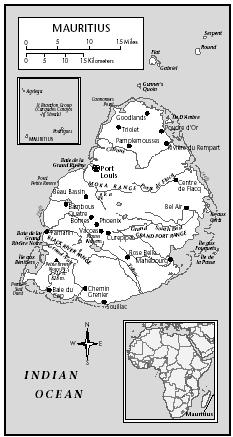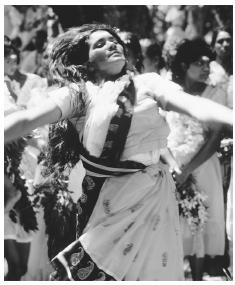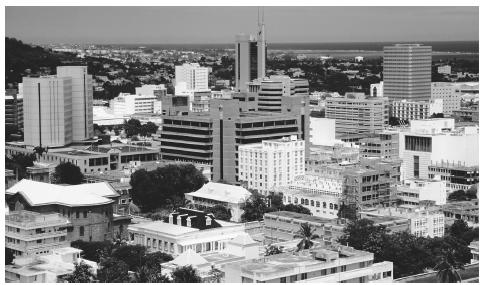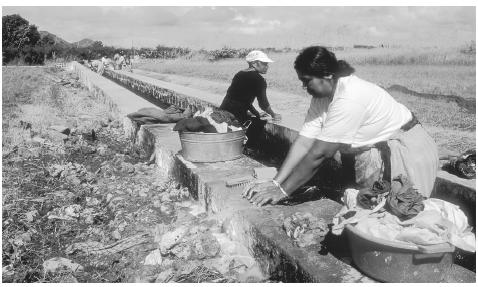Mauritius
Culture Name
Mauritian
Orientation
Identification. The island of Mauritius was apparently uninhabited until 1638. It was then that the Dutch, under the Dutch East India Company, made their first attempt to colonize the land, named after the prince of Denmark, Maurice of Nassau. The people of Mauritius are descendants of European (mostly French) settlers, the Franco-Mauritians; African slaves and creoles, the Afro-Mauritians; Chinese traders, the Sino-Maurtians; and Indian laborers, the Indo-Mauritians. Such cultural diversity and geographic isolation have led to a nationalized sense of pride. There is unity in being a Mauritian despite not having a shared language and customs. For this reason Mauritius is often considered a global example of successful cultural integration.
Location and Geography. A total of 790 square miles (2,046 square kilometers) of land cover Mauritius. These include the island of Mauritius, with 720 square miles (1,865 square kilometers); the island of Rodrigues, about 350 miles (563 kilometers) east of Mauritius; the small Agalega Islands, 580 miles (933 kilometers) north; and the Cargados Carajos Shoals, 250 miles (402 kilometers) north.
The island of Mauritius, where the overwhelming majority of the people live, lies 500 miles (805 kilometers) east of Madagascar and 2,500 miles (4,023 kilometers) southwest of India. Mauritius was formed by volcanic activity that left a plateau in the middle of the island rising 2,200 feet (671 meters) above sea level. This plateau slopes downward to the north until it reaches the sea. In the south and west the plateau drops sharply to the coast. The driest part of the island in is the southwest, which receives about 35 inches (89 centimeters) per year. The center can receive up to 200 inches (508 centimeters) a year. The capital is Port Louis, on the northwestern roast of the island of Mauritius.
Demography. The current population is approximately 1.1 million. The majority live in the capital and largest city, Port Louis. The population density is one of the highest in the world. Immigration came in successive and dramatic waves. This is demonstrated through the official census, first published in 1846. In that year the total population was 158,462. The white and colored population was 102,217, and the Indian population was 56,245. In 1861 the total population reached 310,050. The white and colored population increased to 115,864. The Indian population more than tripled, to 192,634, to become the majority, and the Chinese population first registered at 1,552. In 1921 the white and colored population decreased to 104,216, the Indian population increased to 335,327, and the Chinese increased to 6,745, in a total population of 376,485. The next census was in 1952, which showed the total population at 501,415. Whites and coloreds were 148,238; Indians once again increased, to 335,327; and the Chinese moved to 17,850. In 1962 the census combined the whites and coloreds to become the "general population" and separated the Indians into Hindus and Muslims. In 1983 the census stopped ethnic comparisons altogether in favor of religious groupings. This was part of a government-based objective to de-emphasize ethnic differences. Results from the 1990 census are as follows: 535,028 Hindus, 172,047 Muslims, and 343,395 Christians, with 6,190 listed as Other.
Linguistic Affiliation. There is no official language in Mauritius. Government and administrative work is written in English. The press uses French, which is understood by more of the population than English. The majority of people understand a Creole language. There is no agreed-upon written form of this language, however, so it appears unlikely that this would be adapted as a national

History and Ethnic Relations
Arab and Swahili sailors knew of Mauritius before the 1500s. Portuguese explorers visited in the early sixteenth century. In 1638 the Dutch made attempts to colonize and inhabit the island. They brought small numbers of African slaves and introduced sugarcane to the island. Trouble maintaining the settlements led to their total abandonment in about 1710.
Five years later, Dusfrene d'Arsel claimed the island for France. The French already had nearby Réunion Island, and with these geographic holds the Mascarene Islands became an important base for attacks on British possessions in wartime. Under French rule Mauritius developed colonial plantation patterns.
The British attacked and captured the strategic islands in 1810. Réunion was given back to the French four years later because of the lack of good harbors. The Mauritius culture saw little change with the English takeover. The Cape of Good Hope was a more prized British possession, and subsequently little capital and effort was put into the Mauritian economy.
In 1825 the preferential West Indian sugar tariff was repealed, and the island transformed itself into a sugar-based economy.
Slavery was abolished in 1835. This led to large-scale demographic changes. The majority of the total population were plantation slaves. With the release of obligatory duty, upwards of half the slaves fled the plantations to live in shantytowns or unoccupied land. To make up for the loss in the workforce, plantation owners imported laborers from India. From 1835 to 1845 the Indian population went from nonexistent to a third of the total population.
Emergence of the Nation. Mauritius started self-government in the 1950s, which led to full independence from Great Britain on 12 March 1968. Sir Seewoosagur Ramgoolam was the leader of this movement and afterward became the first prime minister. He served in that post from 1968 to 1982.
National Identity. The national identity of being a Mauritian is forged early in school and continues in the workplace. The mix of cultures forms the identity of the island. With no defining national cultural traits, the question arises whether Mauritius has a unique culture, or whether one is developing.
Ethnic Relations. The 1980s led to an economic boom for the island. This was fueled mostly by the industrialization of the export business. This led to more interracial mingling as the workplace brought previously separated ethnic factions together. This is mirrored in the school system.
The main ethnic groups have been emphasizing their ethnic roots and have helped to set up the Ministry for Culture and Arts to promote cultural activities and a better understanding of the different cultures in Mauritius. Cultural centers accomplish this task at the local level. These tend to reinforce cultural identity and strengthen the independent ethnic groups. Many of these centers obtain outside help from the parent cultures.
Urbanism, Architecture, and the Use of Space
With one of the highest population densities in the world, Mauritius places a high premium on housing. Hindus and Muslims tend to invest their life savings in real estate. Many creoles rent in urban areas. Their unique architecture is known for sharp roofs, long balconies, and canopies. Many of the traditional creole houses have been replaced in places by newer materials and designs. The government, in recognition of the heritage of the older houses, has campaigned to save their designs.
Food and Economy
Food in Daily Life. The foods in Mauritius are as varied as the cultures. Chinese mostly own the restaurants in the cities, and they combine different ethnic foods on the same menu. Street food also is quite common for snacks and includes samosas, roti, curried rolls, soups, and noodles.
At home, rice is the most common staple. This is usually combined with fish, fowl, or red meat and copious spices to form a type of stew. Local vegetables are eaten readily and include chokos, red pumpkins, squash, and greens.
Basic Economy. The Mauritian economy is centered in agriculture and manufacturing. Commerce and services jobs also are evident. The currency is the Mauritian rupee.
Land Tenure and Property. The original Franco-Mauritian families that were given land rights in French colonial times still own more then 50 percent of the sugar fields. Large numbers of Indian planters own the remaining fields. The Chinese own a heavy concentration of commercial property. The creoles have never had any extensive land holdings. The government instituted a sugar tax to deal with the vast inequalities of the sugar industry. In the 1990s the tax was revoked after constant pressure from the sugar estates. However, a program whereby workers could buy shares in the sugar industry was begun.

Major Industries. Sugar has been the historical base of industry. Until 1979, 90 percent of the national economy was based on it. While not as powerful as they once were, the refined-sugar and molasses industries still hold much importance. Textiles and clothing manufacturing also have become important industries, along with chemicals, metals, and machinery. As with many island nations, tourism is an important source of revenue.
Trade. Because of the relatively small size of the island and scarcity of natural resources, Mauritius must import huge amounts of goods from countries such as France, South Africa, and India. Major imports included textiles, petroleum, machinery, metals, and food.
Major exports include industrial products and sugar. Agricultural products also exported are tea, peanuts, tobacco, potatoes, tomatoes, and bananas. Exports tend to be centered on the United Kingdom, France, and the United States. In 1997 the net export value was $1.616 billion (U.S.) and net imports $2.264 billion (U.S.), for a trade deficient of $648 million (U.S.).
Division of Labor. Traditionally, urban industrialization used mostly the creole women as the workforce. Rural industrialization has brought more of the Indian population, who live in higher numbers in the countryside, into the factories. The boom in industry has opened skilled-labor positions to all ethnicities in Mauritius, leading to very low unemployment rates.
Social Stratification
Classes and Castes. The Franco-Mauritians have had land and ownership privileges that the other ethnic groups have not, and they form a small, privileged high class. The Indians and Chinese form subgroups in relation to language, religious branches, and regional origins. Hindi is considered more prestigious among the Indian population, but northern Indian dialects are more commonly used in the countryside. The creoles have had the poorest economic conditions of any group.
Political Life
Government. The British Westminster model of government is the basis for Mauritius. Until 1992 the queen of England was the head of state and queen of Mauritius in a constitutional monarchy, with Mauritius as a commonwealth. In 1992 Mauritius became a republic. The presidency of the republic is a ceremonial office only; the president is appointed by the prime minister and the National Assembly, whose members are chosen via general elections. The prime minister is the leader of the majority in the National Assembly.
In the National Assembly, eight seats in addition to the sixty-two elected seats are awarded to candidates defeated in the general election: four to those candidates who fared the best in relation to the other defeated candidates, and four on a party and community basis. There has been discontent with this system, and a major reworking of the electoral process has been widely discussed.
Leadership and Political Officials. All of Mauritius's prime ministers have been Hindu. The first, Sir Seewoosagur Ramgoolam, led the independence movement in Mauritius.
Social Problems and Control. In February 2000 several days of rioting occurred in Port Louis. A popular creole singer, Kaya, died while in police custody. The creole community suspected the police of misconduct leading to his death and retaliated by protests that spiraled into rioting and violence. Four deaths and fifty million dollars of damage resulted. It was the worst social unrest in Mauritius's history.
Military Activity. The military has an annual budget of $11 million and thirteen hundred active personal. Most of these are trained for internal disputes. Combined with the coast guard they have five hundred boats and aircraft available worth an estimated $87 million.
Nongovernmental Organizations and Other Associations
The first study of nongovernmental organizations (NGO) in Mauritius focused on twenty-six groups as follows: eight, social; five, labor; five, business; four, religious; three, cultural; and one, environmental. Most of these groups have an influential impact on governmental policies.
Gender Roles and Statuses
Division of Labor by Gender. The economic success of industry has led to low unemployment rates. This has changed the workplace and home life as women joined the workforce. This industrialization also led to women being promoted faster. According to the Minister of Women, Family Welfare, and Child Development, a quarter of all managers are now women.
Women are the traditional homekeepers of the society. Between 1985 and 1991 the numbers of women working outside the home increased from 22 percent to 41 percent. With that trend continuing, hired housekeeping and child care have become relatively new and important industries.
The Relative Status of Women and Men. Historically, women have had subordinate roles in Maurition society. However, the Constitution specifically prohibits discrimination based on sex, and women now have access to education, employment, and governmental services.
In March 1998 the Domestic Violence Act was passed. This gave greater protection and legal authority to combat domestic abuse. In that same year it also became a crime to abandon one's family or pregnant spouse for more than two months, not to pay food support, or to engage in sexual harassment.
Women are underrepresented in the government. The National Assembly has seventy seats, of which women hold five.

Marriage, Family, and Kinship
Marriage. Most marriages in Mauritius occur within the same ethnic group; only about 8 percent of marriages are interethnic. Those couples who do intermarry usually take on a single ethnic identity for their children. Those children in turn usually associate with that ethnic group and marry within it.
Ethnic identification is considered to be more important than class and is the single most examined factor in selecting a mate; group and parental influences also are factors. Marriage outside ethnic lines risks the family's disapproval and sometimes can lead to punishment. This carries additional weight in Mauritius, where families typically live with each other because of high land costs.
Socialization
Child Rearing and Education. Education is free from the primary to the tertiary level and is mandatory until age twelve. The government considers education one of its greatest concerns and has an "education for all" policy to ensure fair education to the different socioeconomic groups. Some schools in low-rent areas have large drop out rates, which particularly affects the Creole community. The greatest amount of interethnic mingling occurs in the schools, and this has the promise of leading to the formation of a national identity.
Higher Education. The University of Mauritius was established in 1971. The original focus was oriented toward agriculture and manufacturing. Since 1989 the university has increased its majors to include the humanities.
Etiquette
Most outsiders think of Mauritians as being aloof at first. Among themselves they are quite social and friendly, and this ultimately prevails with visitors and locals alike. Dress is culturally dependent but somewhat conservative. Lightweight and colored fabrics are usually worn. Attire among women can vary from one-piece bathing suits to complete covering, especially among Muslims. Toplessness and nudity are not condoned for either sex.
Religion
Religious Beliefs. Religious freedom is the major key to peace on Mauritius and is a constitutionally guaranteed right. Hindus make up 52 percent of the total population. Christians (28.3 percent), Muslims

Medicine and Health Care
Public and private hospitals are on the island. The private hospitals are generally considered to be of better quality and are more expensive than the public hospitals. Both are adequate, if a little below Western standards.
Malaria is very rare and exists only in the rural areas. Hepatitis A is fairly common. The more severe hepatitis B and C are rare.
Men have an average life expectancy of sixty-six years; women, of seventy-five years.
Secular Celebrations
There are thirteen official state holidays. They are: New Year's Day (1 and 2 January); Chinese New Year (January/February); Thaipoosam Cavadee (January/February); Maha Shivaratree (February/March); Republic Day (12 March); Ougadi-Telegy New Year (March/April); Labor Day (1 May); Ind El Fitr (lunar); Ganesh Chaturthi (August/September); Diwali (October/November); All Saints (1 November) and Christmas (25 December).
The Arts and Humanities
Performance Arts. Popular music from the West and from India are widely listened to. The only original music and the national music is Sega, a tribal-based drumbeat based on African rhythms. It has a ritualistic dance that is often done in tandem. The women dance in sensual ways to lure partners, but they are not allowed to kiss or touch.
The State of the Physical and Social Sciences
The sciences have been neglected in Mauritius at different levels since its inception. The University of Mauritius is trying to focus more energy on research and science, and the government has obtained permission and funding for a new technological university.
Bibliography
Alladin, Ibrahim. Economic Miracle in the Indian Ocean: Can Mauritius Show the Way? , 1993.
Allen, Richard. Slaves, Freedman, and Indentured Laborers in Colonial Mauritius, 1999.
Carroll, Barbara, and Terrance Carroll. "Accommodating Ethnic Diversity in a Modernizing Democratic State: Theory and Practice in the Case of Mauritius." Ethnic and Racial Studies 23 (1): 120–142, 2000.
Nave, Ari. "Marriage and the Maintenance of Ethnic Groups Boundaries: The Case of Mauritius." Ethnic and Racial Studies 23 (2): 329–352, 2000.
Selvon, Sydney. Historical Dictionary of Mauritius , 1991.
U.S. Department of State, Bureau of Democracy, Human Rights, and Labor. 1999 Country Reports on Human Rights Practices: Mauritius, 2000.
Young, Crawford, ed. The Accommodation of Cultural Diversity, 1999.
—D AVID M ATUSKY
Island of Mauritius-There is no comparison!
cheers
I may be relocating there and found the information very helpful, thanks! :-)
Thanks!
Thanks!!!
@ Clive depending on the country of origin of your ancestors there may be a lot of information available, especially at the MGI for information about Indian immigration.
this little piece of work has helped me in a way or other in doing my assignment. i wud really be appreciated if the topic about 'how Indian immigrants were living their daily activities in Mauritius' be discuss on this forum.
thanks for sharing these information.
I am thinking to study Hospitality Management in Mauritius. But I am concerned about the validity and recognition of a degree from Mauritius in the outside world, and I don't really know which universities to look out for if I want to gain a bachelors degree in Hospitality Management. And how is the life of a Muslim individual in terms of halal food in the county. Some insight on this matter will be really helpful, Thank You. :)
thank you
Yvonne
I am conducting a research on Mauritian traditional dress. i would really appreciate any material you may have in terms of images, descriptions or writings.
thank you
I am a Mauritian and reading this made me very proud :)
This really pictures Mauritius in its true sense.
Come and visit Mauritius, you'll not be disapointed!
I do not live there anymore I have been living in Canada for the last decade but I always tell people over here that Mauritius is a model in terms of development and tolerance (acceptance rather)
Responding to Nabeel's question on Halal food, you won't face any difficulties in Mauritius, and you will not only find masjid almost everywhere you can also hear the call to the prayers. I would say in spite of minor tensions, Mauritius is accepting to all religious denominations.
This one factor among other important ones has helped in shaping Mauritius as one of the most dynamic democracies in the world and not only Africa.
thanks a lot. : )
In my blog, I want my readers/viewers to know about this secret African country (Mauritius) and its diverse and beautiful women.
I love what am reading, Mauritius is quite beautiful, how can I get a friend there...!
I believe it will be awesomee visiting!